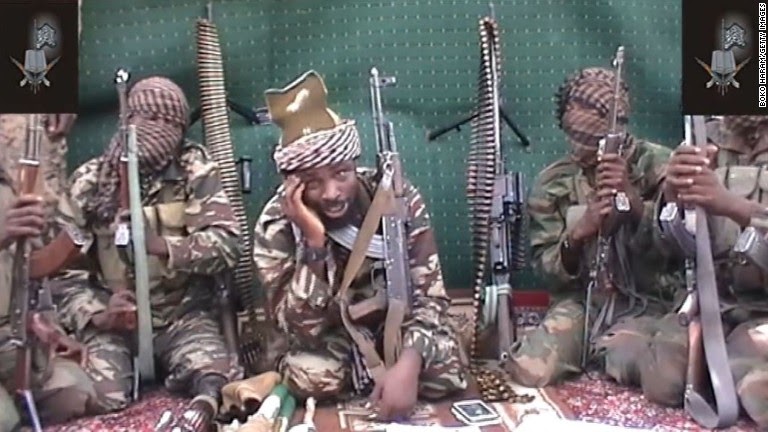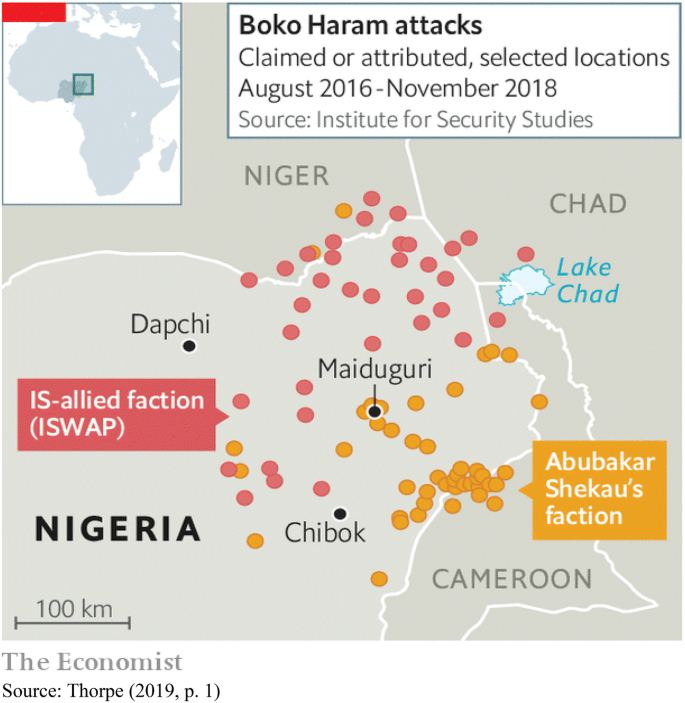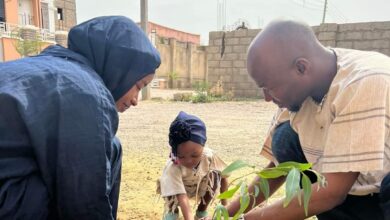How Did Abubakar Shekau Die? Here’s What We Know So Far.
By detonating his explosive vest, Shekau killed at least one other person: Bako Gorgore, former wali (leader) of ISWAP’s Timbuktu governorate who led the assault on Boko Haram’s stronghold.

The circumstances leading to the death of notorious terror group leader, Abubakar Shekau, have been disputed by various reports, with many insisting that he may in fact still be alive. Information reaching HumAngle from informed sources within the insurgency has, however, thrown more light on the developments.
Shekau had since 2009, and until his death, led a faction of Boko Haram known as the Jamā’at Ahl as-Sunnah lid-Da’wah wa’l-Jihād (JAS). HumAngle learnt that the invasion of his group’s camp in the Sambisa forest area on Wednesday by the Islamic State West Africa Province (ISWAP), which broke away from JAS in 2016, was the culmination of years of preparation.
For over a year, ISWAP had adopted a pacifist approach that enabled it to gain the trust of many of Shekau’s fighters and commanders.
Whenever Shekau’s fighters overpowered ISWAP members, they would disarm and kill them, considering them to be traitors (khawarij). But if ISWAP fighters overpowered Shekau’s men, what they mostly did and have done consistently was to disarm, preach to them, and allow them to go.
ISWAP, which is known to lay claim to four governorates in the region, instructed the wali (governor) and ameeru-l-fiha (military commander) of the Timbuktu axis, Bako Gorgore, to lead the operation against Shekau’s camp. The governorate is considered one of the most important ISWAP positions after the Lake Chad islands. ISWAP fighters in the area are closer to Shekau’s area of influence and so often have more information about his movements. They also depended on insider sources to be able to monitor and track him.
During the assault on Wednesday, many of Shekau’s top fighters were either neutralised or already working with ISWAP. This made it easy to trap Shekau.
Several sources informed HumAngle that Shekau, who was in the company of a top lieutenant, was cornered after attempting to escape around the maghrib period (early evening).
Bako Gorgore then approached him alongside a top ISWAP fighter and engaged in a discussion with Shekau after disarming him and his fighter. They tried to persuade Shekau and his follower to remove their suicide vests and surrender themselves. They had also told Shekau they would be fair to him if he gave himself up, in line with plans to simply restrict him in one of ISWAP’s camps.
However, in the course of their discussion, Shekau ordered the top fighter that was with him to detonate his improvised explosive device by calling out in Hausa “ka bude tamin,” but Gorgore’s aide shot him before he could execute the instruction.
Shekau then proceeded to detonate his own suicide vest, killing both himself and Gorgore. Those with Gorgore were at a reasonable distance at the time, HumAngle learnt, and so survived the explosion, which happened outdoors.
Information from the frontlines of the insurgency contradict reports in other media that Shekau shot himself using a gun and may have survived the attempt to take his own life.
The former extremist leader was known by associates to have always worn explosive belts because of his determination not to be captured alive by the Nigerian military.
While suicide is “strictly” prohibited by Islamic law even during warfare, extremist groups such as al-Qaeda and Boko Haram have permitted self-sacrifice as a way of inflicting harm on those they consider their enemies.
With the latest development, ISWAP has completely taken over Boko Haram’s Sambisa camp, but it is not clear if it will be collapsed under the Timbuktu governorate, declared as a new state under the terror group’s control, or even made the new ISWAP operational headquarters.
Shekau left behind an enormous cache of arms. He was obsessed with hoarding weapons because, having survived a number of coup attempts, he did not trust anyone with too much access, believing it would increase the chances of him getting overthrown.
As a result, the success of ISWAP’s onslaught gives the terror group access to an overwhelming amount of arms and ammunition. Likewise, many of Shekau’s fighters have jumped the fence to ISWAP’s faction and the group expects Shekau’s former top commanders, who interfaced directly with members of various cells and sub-factions, to persuade even more men to give in. Majority of JAS’ top lieutenants have already pledged allegiance to ISWAP or are in the process of doing so.
Sources expect ISWAP to release an official announcement soon. They say the silence so far may be because the group is trying to get full control of the situation before making definite statements.
Backed by international jihadi forces, ISWAP has grown in strength and numbers since its formation in 2016. Experts believe that Shekau’s death and a merger between the two rival forces, JAS and ISWAP, will likely worsen the insurgency in Northeast Nigeria and the Lake Chad region.
“It will be a negative development for Boko Haram – and positive for the Lake Chad region – if the death of Shekau worsens the [Boko Haram’s] factional dispute. It will however be a positive development for the group if this leads to a reunification of the group.”
Support Our Journalism
There are millions of ordinary people affected by conflict in Africa whose stories are missing in the mainstream media. HumAngle is determined to tell those challenging and under-reported stories, hoping that the people impacted by these conflicts will find the safety and security they deserve.
To ensure that we continue to provide public service coverage, we have a small favour to ask you. We want you to be part of our journalistic endeavour by contributing a token to us.
Your donation will further promote a robust, free, and independent media.
Donate Here





